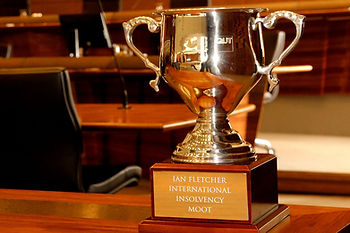Fletcher Moot.
2026 Fletcher Moot
Key Information

The Fletcher Moot is open to teams of two to four law students from professionally accredited law schools. No team member may have previously been or currently be a licensed legal practitioner. Further eligibility requirements are detailed in the 2026 Fletcher Moot Rules below.
Registrations for the 2026 Ian Fletcher Moot are expected to open in September 2025.
Entry to the written portion of the moot competition is free. There will be a fee of £300 payable if a team advances to the oral rounds of the competition.
The 2026 Moot is back in-person!
While the majority of the Moot will be held virtually, we will be bringing back in-person mooting for teams advancing to the Semi-Finals and Finals.
The Semi-Finals and Finals will be held on Friday 17 April 2026, in London, UK
The Preliminary rounds and Quarter-Finals will remain virtual and will take place between Monday 16 and Friday 20 February 2026.
Please note that teams advancing to the in-person rounds will be required to fund their own travel and accommodation. INSOL International and the International Insolvency Institute are not able to provide any funding to teams for this competition.
Problem
The moot problem is a fictional case taking place in a hypothetical jurisdiction that has adopted the UNCITRAL Model Law on Cross-border Insolvency and the UNCITRAL Model Law on Enterprise Group Insolvency.
The problem considers a range of international insolvency laws and raises a number of contentious issues to challenge students’ critical thinking and research skills.

Rules
Download Moot Rules here (2026) (updated 29.8.25).
The oral rounds will take two parts.
The first will be a preliminary round in virtual format in February 2026. A maximum of 16 teams will be invited to participate in the virtual oral rounds based on their performance in the written submissions round.
The top 4 teams in the virtual preliminary rounds will advance to the Semi-Finals and Finals, which will be held, in-person, in London, UK. The date of these rounds will be Friday 17 April 2026.
Submission rules for appellant
Your submission is to appeal and to respond to any cross-appeal (by anticipating the issues they are likely to raise).
Submission rules for respondent
Your submission is to cross-appeal (if relevant) and to respond to the appeal (by anticipating the issues they are likely to raise).
Oral argument outlines will be exchanged between appellants and respondents by teams that progress to the oral rounds.
Resources
Competing teams are required to inform their legal arguments by the Model Laws on Insolvency created by the United Nations Commission on International Trade Law (UNCITRAL).
The competition will challenge students to apply their understanding of key provisions of the relevant UNCITRAL texts and how they relate to international insolvency proceedings. Students will also need to research relevant cases to prepare their arguments, and consult the UNCITRAL Model Law on Cross-border Insolvency (1997) and Guide to Enactment (2013); UNCITRAL Model Law on Enterprise Group Insolvency (2019) and Guide to Enactment (2018); and other UNCITRAL texts.

Visit the UNCITRAL website on Insolvency.
Refer to these UNCITRAL texts:
-
UNCITRAL Model Law on Cross-border Insolvency (1997) and Guide to Enactment and Interpretation (2013)
-
UNCITRAL Model Law on Cross-Border Insolvency: The Judicial Perspective (2013)
Search for case law on the UNCITRAL Model Law on Cross-border Insolvency on the Case Law on UNCITRAL Texts (CLOUT) website.
A non-exhaustive bibliography on UNCITRAL insolvency texts can also be found via the UNCITRAL Library and Research Sources website.
The decision that inspired the 2021 Fletcher Moot can be accessed here.
Past examples
2025 moot

2024 moot
2022 moot
2019 moot
2023 moot
2021 moot
2020 moot
2018 moot
2017 moot
The above submissions are available here as illustrations only, to give prospective teams guidance on the tone and style (though not necessarily the headings) required for submissions. They are not intended as ‘model’ answers, rather as examples.